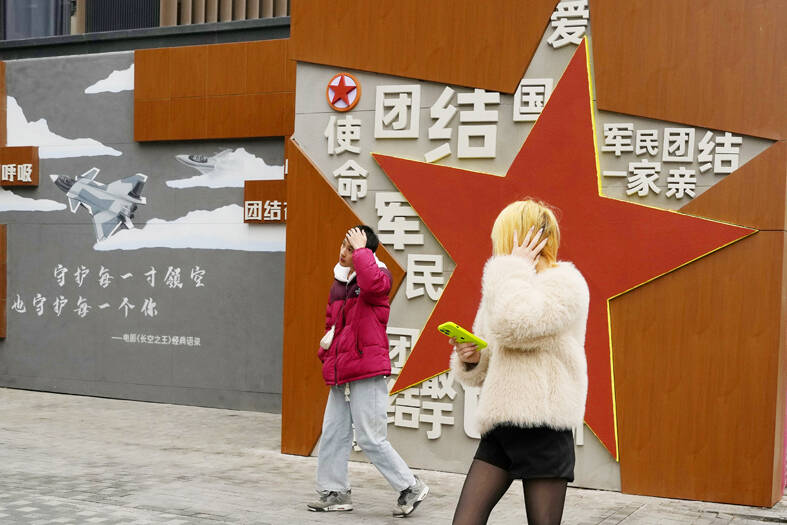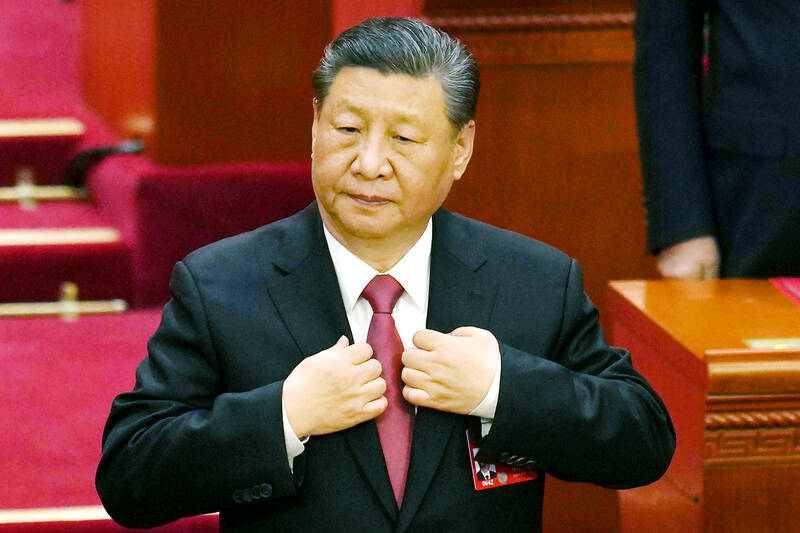Lottery shops in China are ditching bland storefronts to reinvent themselves as hipster hangouts, with slogans that tempt youngsters hit by an economic slowdown with the lure of getting rich quick.
“We should still have dreams, who knows one day they may come true?” reads one sign at one lottery store in Chongqing, in southwestern China. With sleek outside seating styled like a trendy cafe, its tagline is “more than just a lottery shop.”
Another “Lotto Coffee” store in Kunming, capital of the southwestern province of Yunnan, promised a free scratch ticket with every coffee purchase. “A cup of coffee with good luck,” said a slogan on the wall. Sales of scratch-offs, which offer instant results, last year were the highest in data going back to 2008, official statistics show.

Photo: AP
The push to attract younger customers is paying off. Sales from state-approved lottery games soared to a record 580 billion yuan (US$80.6 billion) last year, data from the Finance Ministry show. More than four-fifths of those customers were aged 18-34; up from just over half in 2020, according to domestic market research firm Mob Data.
HARD TIMES
That surge came as youth unemployment soared last year, hitting a record in June as China’s massive economy stumbled out of a prolonged pandemic isolation. Graduates today enter a job market in an era of slower growth than their parents’ generation, and endure cut-throat competition for positions.

Photo: AP
People are likely turning to things like the lottery to “seek their fortune and success simply because of an increasingly stressful economic environment and job market,” said Dominic Chiu, senior analyst at Eurasia Group.
Before the pandemic, lottery sales tended to accelerate when the economy was doing well. That’s because the clientele was mainly lower-income groups including blue-collar workers who only had spare cash when their salaries grew. Now, it’s young, educated and city-dwelling consumers pushing up sales.
While China’s industrial sector surged at the beginning of the year, economists warn the official growth goal of about 5 percent is still ambitious. President Xi Jinping (習近平) bid to wean China off decades of debt-driven growth from the embattled property sector means there’s no big stimulus package coming to the rescue.
“It’s so difficult to make money now, no matter what you do,” said Wu Zehao, 18, a first-year film student at Communication University of China in Beijing.
Speaking outside a lottery shop on a sunny afternoon in a touristy area of the capital, Wu said he had been spending 30 yuan on the lottery every day since he won 100 yuan during a recent holiday. “I seriously think it’s more likely you’ll get rich from the lottery than from working,” he added.
FORTUNE COUPONS
With the overall jobless rate rising again at the start of the year, China’s gloomy employment situation could become a risk to social stability. Young people drove nationwide protests against COVID lockdowns in late 2022 that brought down that policy, and in rare instances even called for the downfall of Xi.
That may help explain why the government is tolerating the lottery boom. The ruling Communist Party has long had a tricky relationship with gambling, outlawing most forms when it took power in 1949 after a civil war. It allowed the lottery to launch in the 1980s as China embraced money-making during the reform period, saying the funds would go to welfare.
Now, lottery outlets are getting creative in their efforts to appeal to youngsters, using slang that they’re familiar with and tapping into lifestyle trends. In Yichang, in the central province of Hubei, one lottery coffee shop selling pistachio croissants displays a large sign over its entrance, reading “Americano comes true.” In Chinese, that sounds like: “Good things come true.”
“What is your dream?” another sign at a lottery shop near a popular shopping mall in Kunming asks. “Buy that bungalow near the sea. Get financial freedom.”
At a Beijing shopping mall, a young woman named Guo Tong who said she worked in livestreaming, was playing scratch-offs. The government has clamped down on her industry in recent years but she complained it was already hard to make money because “there are way too many pretty girls” trying it.
Now, Guo spends 100 yuan a time trying to change her fortunes at lottery stores. She explained: “This is something we can afford that could also make us instantly rich.”

In the March 9 edition of the Taipei Times a piece by Ninon Godefroy ran with the headine “The quiet, gentle rhythm of Taiwan.” It started with the line “Taiwan is a small, humble place. There is no Eiffel Tower, no pyramids — no singular attraction that draws the world’s attention.” I laughed out loud at that. This was out of no disrespect for the author or the piece, which made some interesting analogies and good points about how both Din Tai Fung’s and Taiwan Semiconductor Manufacturing Co’s (TSMC, 台積電) meticulous attention to detail and quality are not quite up to

April 21 to April 27 Hsieh Er’s (謝娥) political fortunes were rising fast after she got out of jail and joined the Chinese Nationalist Party (KMT) in December 1945. Not only did she hold key positions in various committees, she was elected the only woman on the Taipei City Council and headed to Nanjing in 1946 as the sole Taiwanese female representative to the National Constituent Assembly. With the support of first lady Soong May-ling (宋美齡), she started the Taipei Women’s Association and Taiwan Provincial Women’s Association, where she

It is one of the more remarkable facts of Taiwan history that it was never occupied or claimed by any of the numerous kingdoms of southern China — Han or otherwise — that lay just across the water from it. None of their brilliant ministers ever discovered that Taiwan was a “core interest” of the state whose annexation was “inevitable.” As Paul Kua notes in an excellent monograph laying out how the Portuguese gave Taiwan the name “Formosa,” the first Europeans to express an interest in occupying Taiwan were the Spanish. Tonio Andrade in his seminal work, How Taiwan Became Chinese,

Mongolian influencer Anudari Daarya looks effortlessly glamorous and carefree in her social media posts — but the classically trained pianist’s road to acceptance as a transgender artist has been anything but easy. She is one of a growing number of Mongolian LGBTQ youth challenging stereotypes and fighting for acceptance through media representation in the socially conservative country. LGBTQ Mongolians often hide their identities from their employers and colleagues for fear of discrimination, with a survey by the non-profit LGBT Centre Mongolia showing that only 20 percent of people felt comfortable coming out at work. Daarya, 25, said she has faced discrimination since she